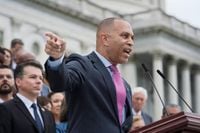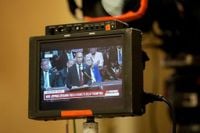In an extraordinary display of parliamentary endurance on Thursday, July 3, 2025, House Minority Leader Hakeem Jeffries (D-N.Y.) took to the House floor in Washington, D.C., to deliver a marathon speech lasting nearly nine hours. Utilizing a seldom-invoked procedural privilege known as the “magic minute,” Jeffries sought to delay the passage of President Donald Trump’s sweeping legislative package, dubbed the “One Big Beautiful Bill.”
The bill, an 800-plus page document, encompasses a broad array of Republican priorities, including $4.5 trillion in extended tax breaks predominantly benefiting the wealthiest Americans, substantial cuts to Medicaid, the Supplemental Nutrition Assistance Program (SNAP), and other social welfare programs, as well as increased funding for immigration enforcement and rollbacks of green energy investments. The legislation represents a defining moment in Trump’s second term and the Republican-controlled Congress’s agenda.
Jeffries began his address just before 5 a.m. Eastern Time and, by mid-afternoon, had spoken continuously for eight hours and 44 minutes, setting a modern record for the “magic minute” — a House tradition allowing party leaders unlimited speaking time once formal debate on a bill has ended. This procedural maneuver, while not a filibuster in the Senate sense, grants leaders like Jeffries the ability to stall proceedings indefinitely by holding the floor without yielding the microphone.
Before Jeffries, the record was held by former House Speaker Kevin McCarthy (R-Calif.), who spoke for eight hours and 32 minutes in 2021 to oppose President Joe Biden’s Build Back Better Act. Nancy Pelosi, another former House Speaker, previously spoke for over eight hours in 2018 to advocate for legislation protecting undocumented immigrants brought to the U.S. as children, known as “dreamers.”
Throughout his extensive speech, Jeffries delivered a scathing critique of the Republican bill, calling it a “reckless Republican budget” and an “immoral document” that would inflict the “largest cut to health care in American history.” He warned that the bill’s provisions would lead to the loss of health insurance for up to 11.8 million Americans, citing analyses from the Congressional Budget Office.
“People will die. Tens of thousands, perhaps year after year after year, as a result of the Republican assault on the healthcare of the American people,” Jeffries declared. “Hospitals will close, including all throughout rural America… People in America will die unnecessary deaths. That is outrageous. It’s disgusting.”
Jeffries shared personal stories and detailed the potential impacts on Medicaid, Medicare, the Affordable Care Act, and children’s health services, emphasizing the bill’s harsh cuts to programs that provide a safety net for working families, seniors, and vulnerable populations. He accused Republican leadership of cruelty and neglect, stating, “Leadership requires courage, conviction, compassion — and yet what we have seen from this administration and co-conspirators on the Republican side of the aisle is cruelty, chaos and corruption.”
Democratic Representative Pramila Jayapal (D-Wash.) urged voters to contact their representatives to oppose the bill, while Congressman Ami Bera (D-Calif.) described the atmosphere in the House chamber as tense, highlighting the stark contrast between Democratic and Republican visions for America’s future.
“We’ve worked over decades to get health care benefits to folks, to address the cost of care, to make sure working families, middle class families have a safety net,” Bera said. “This is going to dismantle a lot of that, and I think that’s what’s shocking a lot of us.”
Despite Jeffries’ extended speech and the unified Democratic opposition, the Republican majority in the House has pushed the bill forward. After a narrow procedural victory early Thursday morning, with some Republican holdouts swayed by pressure from President Trump, the bill was poised for a final vote. Speaker Mike Johnson (R-La.) expressed confidence in securing passage, stating, “We feel very good about where we are and we're moving forward. We’re going to deliver the Big, Beautiful Bill — the president’s ‘America First’ agenda.”
Should the bill pass the House, it would immediately proceed to President Trump’s desk, where he has indicated plans to sign it before the Fourth of July holiday, marking a significant legislative win for his administration.
Polls leading up to the vote reflected public skepticism about the bill. According to a Quinnipiac University survey, 55% of respondents opposed the legislation, which extends tax breaks mainly for the wealthiest Americans. Similar opposition was recorded in polls by Fox News and the Kaiser Family Foundation, with nearly six in ten and 64% of respondents, respectively, voicing disapproval.
Jeffries acknowledged the slim margin by which Republicans could afford to lose votes, noting, “All we need are four House Republicans to join us in defense of their constituents who will suffer mightily from this bill.” However, with Democrats united against the bill, the Republican majority’s hold on power is expected to carry it through.
As Jeffries concluded his historic speech, he reiterated his commitment to “take my sweet time” to tell the stories of Americans who would be harmed by the legislation. His marathon address not only delayed the vote but also provided Democrats with potent messaging for the 2026 midterm elections, framing the bill as a stark transfer of wealth from the poor and middle class to the rich.
While the “magic minute” could not stop the bill’s passage, it underscored the deep divisions in Congress and the high stakes of this legislative battle, with millions of Americans’ health care and social supports hanging in the balance.


